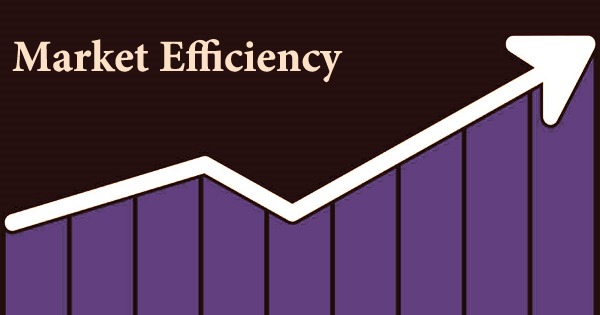Market efficiency is a general concept that refers to any metric that measures the dispersion of information in a market. It refers to the extent to which market prices represent all applicable and accessible data. A market that is effective is one in which all information is distributed perfectly (everyone receives the information), absolutely (everyone receives the entire information), immediately (everyone receives the information at the same time), and without charge (everyone receives the information for free). On the off chance that markets are proficient, all data is now joined into costs, thus its absolutely impossible to “beat” the market in light of the fact that there are no underestimated or exaggerated protections accessible.
Eugene Fama, an economist, coined the word “market efficiency” in his Efficient Market Hypothesis (EMH) in 1970. Fama, on the other hand, admits that the concept is a little confusing because no one has a simple definition of how to perfectly describe or precisely quantify market performance. As per the EMH theory, an investor couldn’t outflank the market, as costs totally mirror all accessible data about a specific resource. It implies that nobody has any benefit in determining a profit from a stock cost, for instance, on the grounds that nobody approaches any data which isn’t yet accessible to every other person.

Harry Markowitz, Fischer Black, Myron Scholes, Jack Treynor, William Sharpe, Merton Miller, Franco Modigliani, John Lintner, Jan Mossin, and Robert Merton were among the financial economists who influenced Fama. Fama later won the Nobel Prize for his efforts. Investors who believe this theory are supporters of passive portfolio management and buy index funds that monitor overall market results.
Market efficiency dose not say that the cost of a resource is its actual cost. It just says that it is difficult to reliably appraise whether the resource cost will go up or down. A productive market is where the market costs of monetary instruments like stocks mirror all data that is accessible. It also instantly adjusts to any new knowledge that is revealed. The market becomes more competitive as the quality and quantity of information improve, reducing opportunities for arbitrage and above-market returns.
The features of an efficient market are as follows –
- Securities prices in a genuinely efficient market represent all relevant information about the commodity, including historical details such as price, volume, and other factors.
- An efficient market allows investors an opportunity to outperform.
- The quality of the market improves as new knowledge is disclosed, reducing the opportunities for excess returns and arbitrage.
- It’s worth noting that market efficiency does not imply that a security’s price reflects its true intrinsic value. It simply states that market participants cannot consistently predict the future price of an asset.
Financial market data isn’t restricted to financial information, statistical surveying, and investigations. Everything, from monetary and political to get-togethers joined with financial backers’ impression of this data, is consolidated in stock costs. At the most basic level, market efficiency refers to a market’s ability to integrate information in such a way that it offers the greatest number of opportunities for buyers and sellers of securities to affect transactions while minimizing transaction costs. All things considered, an efficient market is any market where resource value developments can’t be reliably assessed, i.e., it is unimaginable for a financial backer to reliably bring in cash in a productive market by exchanging monetary resources.
Prices in an efficient market are unpredictable and spontaneous. It makes a planned approach to investment unlikely, according to the Efficient Market Hypothesis (EMH). Hypothesis allies like to put resources into list subsidizes that track the general market execution and fill in as instances of inactive portfolio the executives. As indicated by the efficient market theory formed by American financial analyst Eugene Fama, there are three types of effectiveness. They are –
- Weak form: According to this version of market efficiency theory, current market prices for securities represent past or historical prices. As a result, market investors who buy and sell securities based on historical data should expect to receive normal returns. Subsequently, any new value changes in future can possibly happen if new data turns out to be openly accessible. As indicated by this hypothesis, mainstream contributing techniques like specialized examination or energy exchanging won’t beat the market consistently. But it proposes that there is room for earning excess returns by using fundamental analysis.
- Semi-strong form: The current prices of shares reflect all publicly available information in a semi-strong variation of an efficient market. It contains historical data such as price, volume, and more. As indicated by this type of market efficiency, neither essential nor specialized examination is sufficiently effective to bring predominant returns, in light of the fact that even the principal information is as of now accessible to everybody and consequently, joined in the resource’s cost. It dismisses both technical and fundamental research, claiming that any data obtained by these methods is already available to other investors. Only private knowledge not open to the general public would be useful in gaining a trading advantage, and only to those who have it before the rest of the market.
- Strong form: The strong form of market efficiency, which builds on and incorporates the weak and semi-strong forms, states that market prices represent both public and private knowledge. Given the supposition that stock costs mirror all data (public just as private), no financial backer, including a corporate insider, would have the option to benefit over the normal financial backer regardless of whether he were conscious of new insider data.
At its heart, market efficiency refers to the market’s ability to integrate all available data in order to provide traders and investors with the best possible opportunities. Practitioners and academics are constantly debating whether the market is successful. Investors assume a crucial part in making a market productive. Yet, to get it going, they should have an idea that the market is wasteful in any case and can’t be outflanked.
Active traders exist, according to some who do not believe in an open economy. There should be no reason to become an active investor if there are no ways to gain profits that outperform the market. Amusingly, speculation systems that are embraced by different financial backers to abuse market failures have a fundamental influence in making the market proficient. Ongoing investigations show that numerous financial backers have prevailing with regards to outflanking the market on a predictable premise.
Information Sources:
















